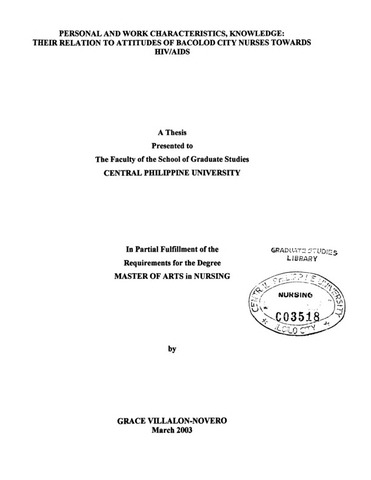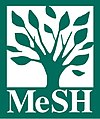Personal and work characteristics, knowledge: Their relation to attitudes of Bacolod City nurses towards HIV/AIDS
요약
HIV/AIDS is a palpable pandemic in our midst which has been declared an emergency by the World Health Organization (WHO). Epidemiological observations estimate close to as many as 100,000 infections per year in the Philippine setting if proper educational and preventive strategies are not implemented in time.
Because of the nurses’ involvement as a professional health care giver, the International Council of Nurses (ICN) and the WHO issued a Joint Declaration on AIDS in April 1997 that set out the rights and responsibilities of nurses throughout the world in caring for people with HIV/AIDS. Despite such guidelines, still there are cases of abandonments even up to the extent of resignations and documented search of registered nurses for non-medical employment. A British study called for more research into the attitudes of professional health carers, particularly nurses, to HIV/AIDS since attitudes are very important in determining standards for care delivery. More research is needed into the effects of attitudes on the delivery of health care.
It was therefore the purpose of this study to find out the personal and work characteristics of the Bacolod City Nurses, their knowledge level on HIV/AIDS and their association to attitude on HIV/AIDS. This research undertaking was conducted in March 2000, employing a one-shot questionnaire survey in order to study the actual picture and the direction of relationship between the variables that are hypothesized to be significantly associated and attempt to explore the causes of the particular phenomena existing between such variables. A sample size of 203 nurse-respondents was obtained from the city’s five tertiary hospitals by systematic sampling with random start from the list of names that were secured from the respective Nursing Director or Chief Nurse of each hospital. To ensure the reliability of the data gathering instrument, the test and retest method was employed by administering the test to a 60 percent population of the nurses (49 nurses) permanently employed at another hospital which was not part of the actual research group. The Pearson Product Moment Correlation was used to establish the reliability (r =0.62) of the knowledge portion of the questionnaire while the z-test yielded Z= 3.12 (Z .05 = 1.645) was used for the attitude portion where twenty-two (22) respondents consistently answered at least 25 questions out of the 35 fielded.
With the aid of the Statistical Package for Social Sciences (SPSS) program, the frequency percentages were used to describe the qualitative data while the mean was utilized to describe the quantitative data. Chi- square test for independence was applied to determine whether a significant relationship existed between the variables used in the study. The PPM was utilized to determine whether there was a significant relationship between knowledge and attitude scores. The SPSS sub-program crosstabs came in handy in computing the exact probability.
Findings show that nurses in the City of Bacolod have a high level of knowledge with regards to the general and current information on HIV/AIDS - its transmission modes, detection, signs, symptoms, complications, treatments, intervention and the employment of universal precautions as preventive measure. However, there is a noted confusion as to whether or not the breastmilk of an infected mother; casual contact; sharing food, water and utensils; being sneezed/coughed at by an AIDS client; sitting in public toilets and swimming in public pools are routes for transmission of the disease. Such was also the findings obtained by George Bishop on Singaporean nurses.
There is a marked ambivalence in attitude regarding the different issues concerning AIDS among the respondents.
There is no association between the nurses’ personal characteristics of gender, age, civil status, religious practice /faith, average monthly income and education and their attitude towards AIDS.
Work related characteristics such as length of nursing practice, rank or job position, and experience in actual AIDS case handled are found to have no associations to the respondents’ attitudes.
Furthermore, it was statistically seen that there is no significant association (r = 0.013 with p value = 0.850) between the nurses’ level of knowledge about AIDS and their attitude towards it.
On the average, the Bacolod City nurse is willing to care for an HIV/AIDS client with reservations. Hospital in-service trainings/lectures on HIV/AIDS by respective Nursing Service Offices provide a great source of information for the nurse-respondents.
The results of the research show findings that are contrary to earlier studies done in the U.S. and Europe. The marked difference may be attributed to these factors:
1. the Filipino nature is basically self-sacrificing and the findings herein presented are similar to the findings of the Mexican study by Marcelline Fusilier (1995) in that despite technical and informational limitations, nurses are constrained to maximize their service;
2. the prevalence rate of HIV/AIDS in the Philippines is still relatively low as to affect a higher degree of negative or positive feelings or attitudes.
The above findings ought not to deter one from digging deeper into the Filipino nurses’ character and attitude and from studying how such potentials may be maximized to serve the fullest intentions of the nursing profession.
기술
Abstract only
추천 인용
Novero, G. V. (2003). Personal and work characteristics, knowledge: Their relation to attitudes of Bacolod City nurses towards HIV/AIDS (Unpublished Master's thesis). Central Philippine University, Jaro, Iloilo City.
유형
Thesis학과
School of Graduate Studies정도
Master of Arts in Nursing선반 위치
GSL Theses 610.73072 N858
물리적 설명
xi, 118 leaves




